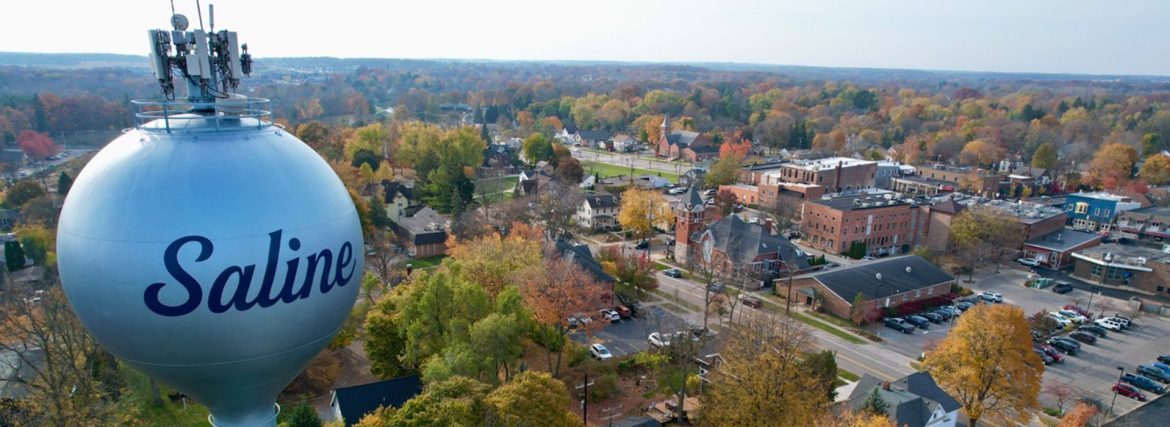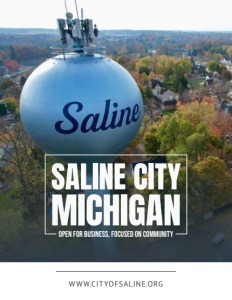Open for Business, Focused on Community
How a Michigan City is Using a Custom Approach to Business, Housing, and Placemaking to Build Its Future.
Nestled in the heart of Michigan, the City of Saline represents the quintessential American small town, a community where deep roots fuel a forward-thinking vision. Mayor Brian Marl, whose family has called the city home for six generations, describes it as “a very special place” with “a beautiful historic downtown, world-class schools, excellent parks and recreation areas, and a populace that is very engaged, civically minded, and inclined to help those in need.”
But Saline is more than just its charming aesthetics, it is a proactive municipality strategically leveraging these assets to drive economic development and enhance quality of life. Through a combination of transformative public-private projects, innovative housing strategies, and a uniquely tailored approach to business development, Saline is thoughtfully building a dynamic and sustainable future while preserving the community character that defines it.
A Dynamic and Strategic Downtown
The historic downtown serves as the vibrant commercial and social core of Saline, a status actively cultivated through the strategic work of Saline Main Street. As an extension of the Michigan Main Street and Main Street America programs, the organization implements a comprehensive framework focused on design, economic vitality, organization, and promotion.
This approach translates into tangible action, from major events like the 20th-anniversary Oktoberfest celebrating the city’s significant German heritage to beautification efforts and robust business engagement. A recent MEDC (Michigan Economic Development Corporation) Vibrancy Grant is facilitating a new ground mural in a downtown alley, enhancing public spaces.
Executive Director Mary Detling explains the overarching goal is to “make the downtown as attractive as possible to attract new and sustainable businesses, including experiential retail.” The vision, she says, is about “providing a space for the community” and creating multiple reasons to visit.
The Town Square Initiative
A long-envisioned downtown town square is now poised to become reality, marking a transformative leap for the city center. After years of discussion, the city moved decisively to create a community gathering space through an innovative public-private partnership.
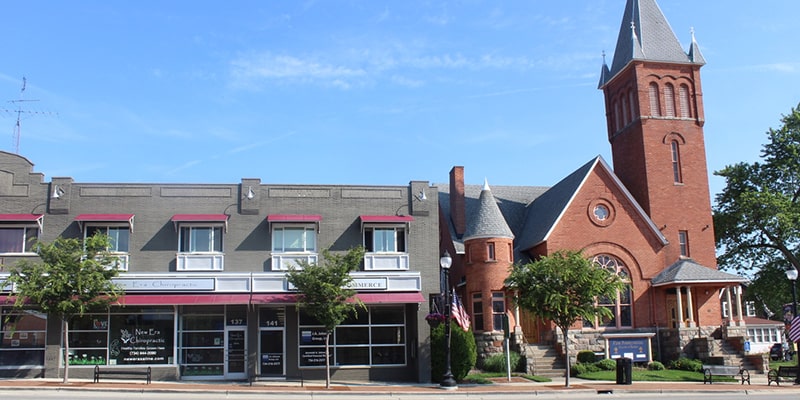
The project joins city-owned land with a portion owned by a major local property, leveraging a cloistered, underutilized green space. Marl highlights its strategic advantages, noting, “there’s a level of intimacy in that area of our downtown, which would be very appealing for certain events and functions.”
A pending grant application with the MEDC would fund not only the town square but also a renovation of the adjacent historic Opera House. The broader vision includes converting the upper floors into four loft apartments and the basement into a speakeasy, while the exterior will feature a performance platform and a tower painted for theater shows.
Acting City Manager Elle Cole explains the space will act as a safe, family-friendly hub during events like the farmers’ market, calling it “the epicenter for downtown movement.” Its adjacent city-owned parking lot provides the flexibility to host larger festivals, making the entire area a versatile, programmable asset.
A Diversified and Attainable Housing Strategy
Saline’s high demand, driven by its excellent schools and safe neighborhoods, presents the challenge of ensuring a diverse and attainable housing stock. In response, the city is proactively building what Cole calls a “capital stack of homes,” aiming for a diverse set of offerings for the community.
This strategy is already materializing with key projects. Momentum from the town square initiative spurred a private developer to commit to a four-story, mixed-use building on a prominent downtown green space, featuring 30-48 residential units above first-floor retail.
Simultaneously, a city-led initiative on Monroe Street is nearing completion. Marl explains the city aggressively marketed a parcel at a reduced price to create housing that, “while not affordable by the formal definition, is sort of obtainable or close to entry-level housing for a community like Saline,” featuring smaller lots and one-car garages. “That development currently is probably about 60% complete,” he adds, “with final completion expected by either the end of this calendar year or first quarter 2026.”
To further this comprehensive approach, Saline has also established a housing coalition with the county to continuously identify new opportunities for adding depth and complexity to its housing portfolio.
Reinventing a Community Asset
Prior to the global health pandemic, the Saline Recreation Center was on a “more sustainable trajectory than it had been at any other point since its inception in the 1990s,” with solid and growing membership, explains Marl. However, a state-mandated, six-month closure and subsequent slow recovery have necessitated significant contributions from the city’s general fund, a situation city leaders believe is not sustainable long-term.
In response, a Rec Center Task Force is now evaluating innovative solutions. A key challenge and opportunity is its regional role, the center serves the entire Saline Area Schools district, not just city residents.
Cole states they are “really looking at what ways can we do this to sustain this extremely important asset in our community long term,” including exploring regional partnerships with townships, the county, or the school district, potentially through an authority model.
Simultaneously, the city is thinking outside the box, considering a “mixed use” model for the facility. Cole explains they are looking at how the rec center could be modified to include a childcare facility, either leased to an operator or run by the city, to address a major community need while generating ancillary revenue and securing the future of a valued asset, notably its unique and highly-regarded pool. “We have been so blessed with a talent that’s come from all different parts of this community,” says Cole, “and we know together that we’re going to come up with an excellent solution.”
A Custom Approach to Business
When asked if Saline is open for business, Mayor Marl’s answer is an “emphatic yes.” This commitment is backed by a uniquely tailored approach to economic development. The city forgoes a one-size-fits-all model in favor of a bespoke strategy. Cole explains that they have a “build-your-own tax incentive” process, noting, “we treat each business individually. We sit down, we talk with them, we talk about what’s most meaningful to them, where their pain points are, where we can remove them.”
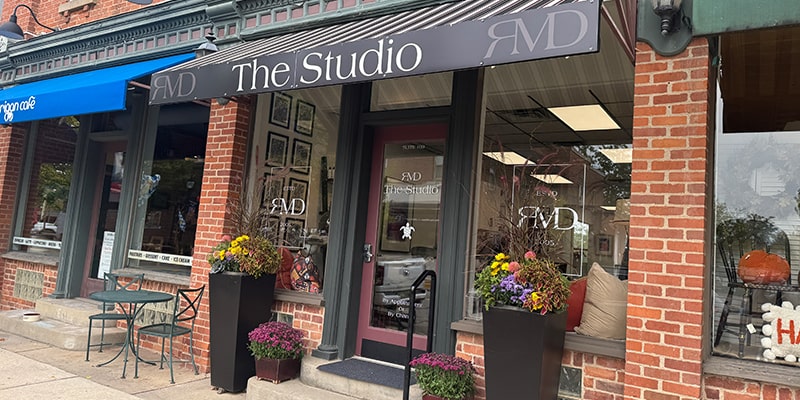
This agility is matched by a relentless drive for efficiency. The city has streamlined its development processes, slashing one key approval timeline from 22 days down to just two. This internal focus is amplified through strong collaboration with regional partners like SPARK Ann Arbor and state entities like the MEDC. Direct engagement is also prioritized through annual Large and Small Business Summits.
At the street level, Saline Main Street supports downtown ventures with practical tools like sign grants and assistance securing MEDC “Match on Main” awards. This concerted effort is yielding results, cutting downtown vacancies in half and fostering creative pop-ups, such as an “artist in residence” in a previously empty storefront. “Making our downtown as inviting as possible and the process as simple and helpful as possible, I think, was a big hurdle that we addressed together,” reflects Detling.
“We’ve really done a lot of focus on customer service and meeting our potential businesses and our current businesses where they’re at and seeing how we can be most agile to support them in their growth for our community,” Cole adds. This ensures the city’s growth is not just permitted, but actively powered by its leadership, creating a truly business-centric environment.
A Collaborative Commercial Core
The strength of Saline’s business community is best illustrated by its vibrant and collaborative downtown establishments. These are not just businesses; they are community institutions and destinations. Detling points to Carrigan Cafe as a “downtown hub” where people go for connection. Brecon Grille is a long-standing mainstay, with Cole noting it’s a fixture on the city’s four corners adding “I don’t know that Saline would feel the same without it.”
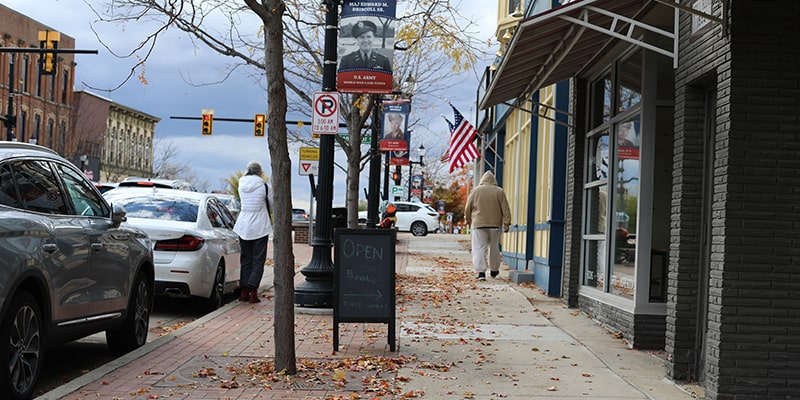
Other icons include Mac’s Acadian Seafood Shack, which transformed vacant storefronts nearly 30 years ago, and Salt Springs Brewery, a destination brew pub housed in a historic church that has earned national recognition. Newer additions like DropTop Pizza contribute to the energy with its gourmet, deep-dish pizza and unique car-themed artwork.
What truly sets Saline apart, however, is the synergy between these businesses. Marl highlights this as a unique differentiator, “our restaurateurs collaborate with one another and actually get along.”
“They are very much committed to one another’s success, they see themselves as complementing one another,” Marl adds, “They’ve all sort of developed a unique niche, which I think allows each of them to exist and hopefully to thrive for years to come.”
A Clear Vision for the Next Chapter
Looking forward, Saline’s leadership has a clear and actionable roadmap for sustained prosperity. Marl outlines key priorities, ”economic development, the economic health and well-being of the Saline community, filling our existing storefronts, attracting new businesses, and providing the resources and tools to our existing businesses so that they thrive for years to come.“
This is coupled with ongoing infrastructure investment in water, sewer, and roads, alongside an evaluation of the Mill Pond Dam. Recreation and enrichment remain central, with plans to enhance parks like Mill Pond Park and secure a sustainable future for the recreation center.
For Main Street, the focus turns to activation. Detling emphasizes programming the new town square and launching a new marketing campaign with Storyville Cities to profile local businesses, “just really pushing the promotion of downtown as a whole,” she says.
These priorities are strategically interconnected. As Marl notes, the town square project alone “touches on economic development, parks, recreation and enrichment, and there’s infrastructure improvements that will need to take place.” This holistic approach ensures that Saline’s investments are synergistic, building a resilient and vibrant community poised for long-term success.
AT A GLANCE
Who: City of Saline, Michigan
What: A quintessential small city leveraging public-private partnerships and strategic planning to drive downtown revitalization, housing development, and business growth.
Where: Washtenaw County, Michigan
Website: www.cityofsaline.org
PREFERRED VENDORS/PARTNERS
Liebherr Aerospace Saline, Inc.: www.liebherr.com
Liebherr-Aerospace Saline, Saline, Michigan (USA) is an OEM Service Center providing aftermarket support of the broad aerospace and transportation product line manufactured by Liebherr. Full life cycle support activities for air management, heat transfer, flight controls, landing gears, and electronics are centralized at the industrial campus located in Saline, MI.
American Soy: www.americansoy.com
American Soy Products produces high-quality aseptic products, including broths, stocks, medical foods, pet foods, and beverages. Since being acquired by Morgan Foods Inc. (Austin, Indiana) in 2018, our facility has benefited from over a century of food industry expertise, enhancing our quality, capacity, and commitment to excellence.
